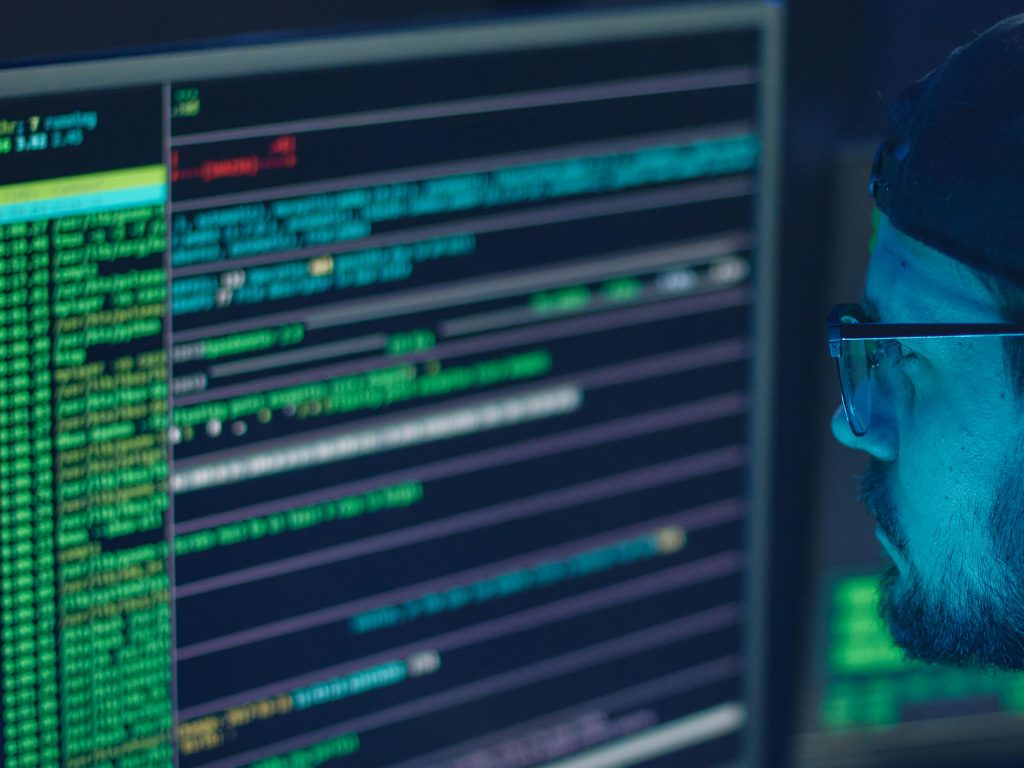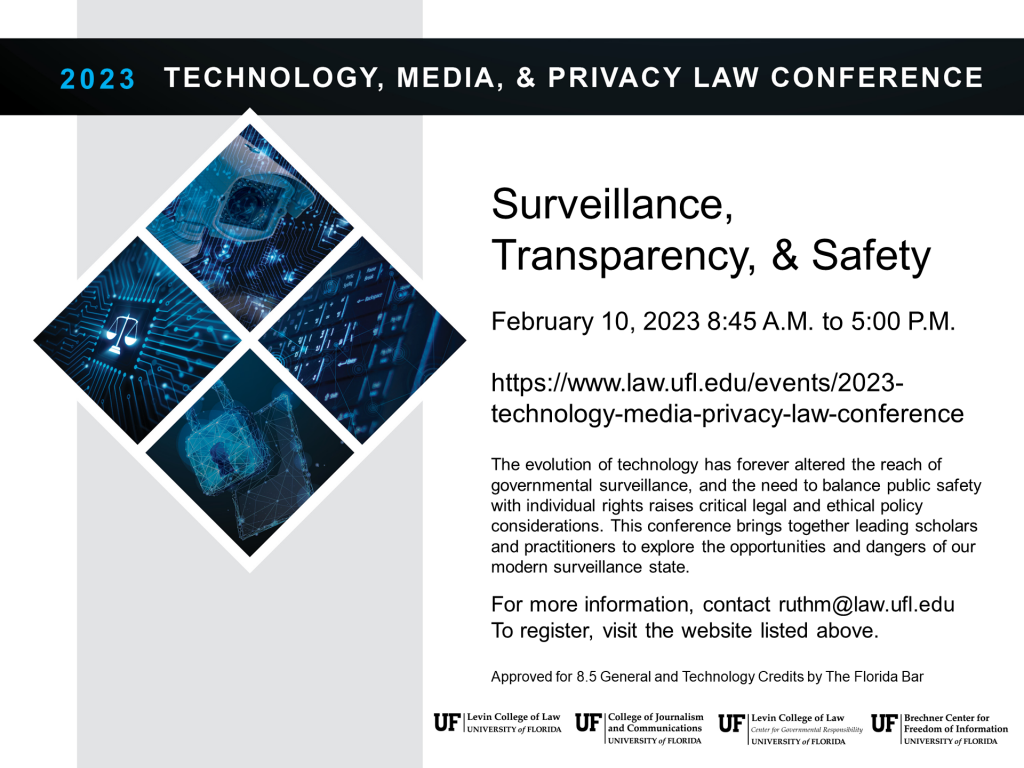
2023 Technology, Media, & Privacy Law Conference
Friday, February 10, 2023 | 8:45 a.m. – 5:00 p.m. ET
Surveillance, Transparency, and Safety
![]() About the Technology, Media, & Privacy Law Conference
About the Technology, Media, & Privacy Law Conference
The Technology, Media, & Privacy Law Conference addresses how technological advancements are reshaping privacy and free speech issues in the fields of law, journalism, and public policy. The rapid adoption of Artificial Intelligence across government and commerce raises a host of urgent legal and ethical policy choices. The evolution of technology has forever altered the reach of governmental surveillance, and the need to balance public safety with individual rights raises critical legal and ethical policy considerations. This conference brings together leading scholars and practitioners to explore the opportunities and risks of entrusting crucial decisions to automation.

The TMPL conference is hosted by the Center for Governmental Responsibility (CGR) at the University of Florida Levin College of Law and the Brechner Center for Freedom of Information at the University of Florida College of Journalism and Communications.
The 2023 Technology, Media & Privacy Conference will be held in-person in Gainesville and virtually via Zoom. The Conference is being held at the University of Florida Levin College of Law in the Chesterfield Smith Ceremonial Classroom in Holland Hall 180. Green Parking restrictions will be lifted for the event.
Registration is free. CLE credits: 8.5 General credits and 8.5 Technology credits have been approved by The Florida Bar.
2023 Conference Schedule:
Friday, February 10, 2023
- 8:45 a.m. – 9:00 a.m. ET | Welcome Address and Introductions
- Peter Molk, University of Florida Levin College of Law, Associate Dean for Research and Faculty Development
- Jon Mills, University of Florida Levin College of Law, Professor and Director, Center for Governmental Responsibility
- 9:00 a.m. – 10:30 a.m. ET | Session 1: Predictive Policing Police have always hoped to prevent crime. Predictive policing is a term that is now applied to programs that predict where crimes may occur. That concept has gone as far as seeking to identify individuals who may commit a crime in the future and endeavor to prevent them from doing it. Is this concept merely modernized police work or a dangerous step towards a dystopian surveillance state?
- Amy Stein, University of Florida Levin College of Law, Cone, Wagner, Nugent, Hazouri & Roth Professor of Law (Moderator)
- Andrew Ferguson, American University Washington College of Law, Professor of Law
- Daniel Marshall, Southern Legal Council, Pro Bono Director and Attorney
- Katherine McGrory, ProPublica, Reporter
- Jonathan Barry-Blocker, University of Florida Levin College of Law, Visiting Legal Skills Professor
- 10:45 a.m. – 12:15 p.m. ET | Session 2: Data Privacy and Individual Rights In the era of Big Data, there are massive troves of information on individuals. Those data profiles are facilitated by voluntary participation in the digital society. Online purchases, social media and the value of information have collectively driven the collection of data. The use of that data may be by private companies or by governments. The data gathered may be used to sell products or to identify criminal suspects. How does the use of new technologies affect individual privacy and fourth amendment rights? How does the harvesting data through social media or from the multiple devices from the internet of things have an impact on individual privacy rights? Where is data privacy law – in Washington, in the states, and overseas – heading?
- Jasmine McNealy, University of Florida College of Journalism and Communications, Associate Professor and Associate Director, Marion B. Brechner First Amendment Project (Moderator)
- Jolynn Dellinger, Duke Law School, Stephen and Janet Bear Visiting Lecturer and Kenan Senior Fellow, The Kenan Institute for Ethics at Duke University
- Amy Gajda, Tulane University School of Law, Class of 1937 Professor of Law
- Margaret Hu, William & Mary Law School, Professor of Law
- Ron Krotoszynski, University of Alabama School of Law, John S. Stone Chair, Director of Faculty Research, and Professor of Law
- 12:30 p.m.– 1:30 p.m. ET | Keynote Luncheon Address
- Julia Angwin, The Markup, Founder
- 1:45 p.m. – 3:15 p.m. ET | Session 3: Transparency and the Press The press has always played a role in holding government accountable. With technological advances such as body-cams and chat apps, government agencies are creating and storing more data than ever before. Yet journalists say it has never been harder to get information out of agencies from the Pentagon down to the smallest local police department, which increasingly greet requests with “so-sue-me” defiance. Mass school shootings in Parkland and Uvalde have resulted in legal battles between journalists and law enforcement, illustrating how privacy law can be weaponized to conceal official misconduct or incompetence.
- Frank LoMonte CNN, Counsel (Moderator)
- Lyrissa Barnett Lidsky, University of Florida Levin College of Law, Raymond & Miriam Ehrlich Chair in U.S. Constitutional Law
- Dana McElroy, Thomas & LoCicero, Managing Partner, Fort Lauderdale
- Ayan Mittra, Texas Tribune, Senior Managing Editor
- Russell Weaver, University of Louisville Louis D. Brandeis School of Law, Professor of Law and Distinguished University Scholar
- 3:30 p.m. – 5:00 p.m. ET | Session 4: Artificial Intelligence and Surveillance Artificial Intelligence can empower police and prosecutors to aggregate and analyze disparate pieces of data, and machine learning can improve that capacity. Artificial Intelligence is providing an important law enforcement tool. When combined with various information gathering technologies, such as CCTV, facial recognition, and social media research it appears that universal profiling is a possibility. What should the government disclose about its use of surveillance technologies, and what are the constitutional guardrails against government intrusion?
- Jonathan Barry-Blocker, University of Florida Levin College of Law, Visiting Legal Skills Professor (Moderator)
- AJ Alvero, University of Florida Department of Sociology, Criminology & Law, Computational Social Scientist
- David Aronberg, 15th Judicial Circuit, State Attorney
- Tracey Maclin, University of Florida Levin College of Law, Raymond & Miriam Ehrlich Chair in U.S. Constitutional Law
- Mark Puente, The Marshall Project – Cleveland, Staff Writer
